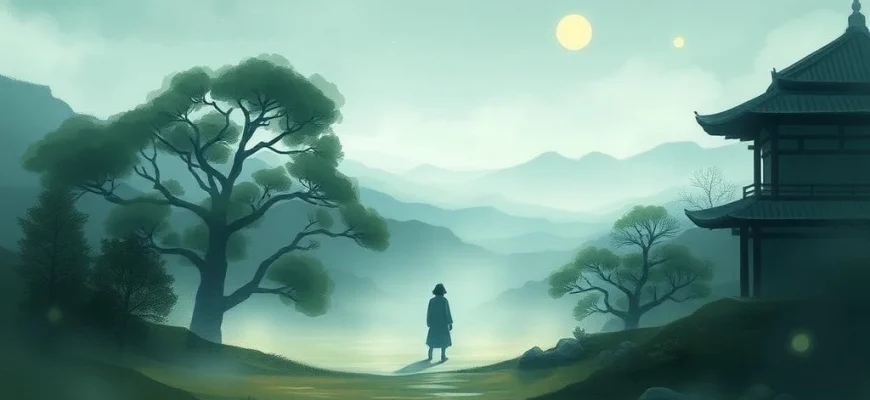If you loved the serene yet mysterious world of 'Mushi-Shi (2005)', you're in for a treat. This article explores 10 similar movies and shows that capture the same ethereal beauty, philosophical depth, and quiet storytelling. Whether you're a fan of supernatural folklore or meditative narratives, these recommendations will transport you to worlds just as enchanting.

Only Yesterday (1991)
Description: A slice-of-life film that delves into the memories of a woman revisiting her childhood. The reflective and understated storytelling, combined with lush rural settings, creates a similar meditative experience.
Fact: This was the first Studio Ghibli film to be directed by someone other than Hayao Miyazaki or Isao Takahata. It was based on a manga by Hotaru Okamoto and Yuko Tone.
 Watch Now
Watch Now 
Pom Poko (1994)
Description: A fantastical tale about tanuki struggling to save their habitat from urban development. The film blends humor, folklore, and environmental themes, much like the reference title's mix of the supernatural and the everyday.
Fact: The tanuki in the film use their shape-shifting abilities in creative and often hilarious ways. The film was directed by Isao Takahata, co-founder of Studio Ghibli.
 Watch Now
Watch Now 
Haibane Renmei (2002)
Description: With its ethereal atmosphere and exploration of existential themes, this series creates a world where angelic beings grapple with their purpose and past lives. The slow, introspective pacing and mysterious setting are key similarities.
Fact: The series was created by Yoshitoshi ABe, who also did the character designs for Serial Experiments Lain. It was originally a doujinshi (self-published work) before being adapted into an anime.
 Watch Now
Watch Now 
Natsume's Book of Friends (2008)
Description: This series shares a serene and contemplative tone, focusing on supernatural beings and the human connections to them. It explores themes of loneliness, belonging, and the unseen world with a gentle, episodic storytelling approach.
Fact: The protagonist, Takashi Natsume, inherits a book from his grandmother that contains the names of spirits she had subdued, binding them to her will. The series is based on a manga by Yuki Midorikawa.
 Watch Now
Watch Now 
Summer Wars (2009)
Description: While more modern and action-packed, this film shares a focus on family bonds and the intersection of the ordinary and the extraordinary. The vibrant animation and heartfelt narrative create a similar emotional impact.
Fact: The film's virtual world, OZ, is a massive online community where much of the action takes place. It was directed by Mamoru Hosoda, who also directed The Girl Who Leapt Through Time.
 Watch Now
Watch Now 
From Up on Poppy Hill (2011)
Description: Set in post-war Japan, this film captures a nostalgic and gentle atmosphere, focusing on the lives of students and their efforts to preserve their school's clubhouse. The emphasis on memory and tradition is a key similarity.
Fact: The film is based on a 1980 manga by Chizuru Takahashi and Tetsuro Sayama. It was co-written by Hayao Miyazaki and directed by his son, Goro Miyazaki.
 Watch Now
Watch Now 
Children Who Chase Lost Voices (2011)
Description: A film that blends fantasy and adventure with deep emotional resonance, exploring themes of loss, longing, and the connection between worlds. The lush visuals and melancholic tone are reminiscent of the reference title.
Fact: Directed by Makoto Shinkai, this film is often compared to Studio Ghibli works for its art style and storytelling. It was originally titled 'Journey to Agartha' in some regions.
 Watch Now
Watch Now 
The Wind Rises (2013)
Description: A historical drama with a dreamlike quality, this film explores the life of an aircraft designer with a mix of realism and fantasy. The contemplative pacing and beautiful visuals align closely with the reference title's style.
Fact: This was Hayao Miyazaki's final film before his first retirement. It is loosely based on the life of Jiro Horikoshi, the designer of the Mitsubishi A6M Zero fighter plane.
 Watch Now
Watch Now 
The Eccentric Family (2013)
Description: A blend of the mundane and the magical, this show delves into the lives of shape-shifting tanuki and their interactions with humans. It balances whimsy with deep emotional undercurrents, much like the reference title.
Fact: The story is set in modern-day Kyoto and incorporates Japanese folklore about tanuki, who are known for their mischievous nature and shape-shifting abilities.
 Watch Now
Watch Now 
Spice and Wolf (2008)
Description: This series combines a historical setting with supernatural elements, focusing on the relationship between a traveling merchant and a wolf deity. The emphasis on dialogue, economics, and folklore creates a unique and immersive experience.
Fact: The series is notable for its detailed depiction of medieval economics and trade, which is rare in anime. The wolf deity, Holo, is one of the last of her kind.
 Watch Now
Watch Now 








